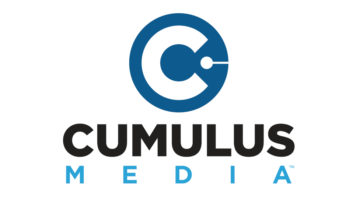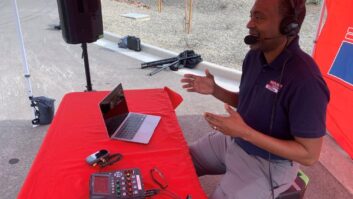ATLANTA — The potential for a financial turnaround by the second largest U.S. radio broadcast group is being viewed with skepticism by some business observers. However, others say it is improbable Cumulus Media Inc. will crumble despite its heavy debt.
The high-profile shakeup of corporate management in September is seen as a start to the rebuilding process at a company that grew dramatically through acquisitions — two big ones and at least 40 smaller deals — but has struggled with debt and suffered massive employee turnover, according to observers.
Cumulus Media’s dramatic management reorganization devalued its stock price — it trades as “CMLS” on the NASDAQ stock market — even further. Cumulus stock was down approximately 80 percent year-to-date and in October was hovering around 75 cents per share. The broadcaster’s second quarter revenues were down about 10 percent from the same period in 2014.
The Cumulus portfolio includes 460 AM and FM radio stations in some 90 markets. The company, founded in 1997 by Lew Dickey, acquired Citadel Broadcasting in 2011 for $2.5 billion in stock and cash, according to business reports at the time. Cumulus also owns syndication service Westwood One and has an ownership stake in Rdio, an online music streaming service (soon to be shuttered; see “Pandora to Acquire Key Assets From Rdio” for the latest).
Bankruptcy rumors had swirled around Cumulus in recent months, according to various business reports. In September, Moody’s cut the company’s rating to nearly junk status because of its debt load, according to StreetInsider.com.
Cumulus had $1.26 billion in revenue in 2014, but the broadcaster had only $11.8 million in net income, down from $176 million the previous year, according to its financial reports. The company has been in cost-cutting mode for some time, according to a variety of news stories, which also cite a 48 percent turnover rate for Cumulus’ approximately 5,000 employees in the past 18 months.

Mary Berner
A NEW ERA
The broadcaster appointed Mary Berner as CEO in September, replacing Dickey. Lew Dickey remains on the Cumulus Media board as vice chairman. His brother John, the company’s executive vice president of content and programming, left the company in September.
Radio World requested interviews for this story with Cumulus officials, including Berner and Dickey; those requests were declined.
Various media reports indicate the company shakeup likely was initiated by Chairman Jeffrey Marcus, who is also a partner in Crestview Partners and owns a 27 percent stake in Cumulus.
Berner had been appointed to the Cumulus board earlier this year. She signed a three-year CEO deal with Cumulus that pays a $1 million signing bonus and annual salary of $1.45 million, according to regulatory filings.
In a webcast address to Cumulus employees immediately after starting work, Berner denied that a Chapter 11 bankruptcy filing was imminent and assured employees that a turnaround is coming. Berner also expressed support for the Nash country brand, in which Cumulus has invested a great deal of money and time. Her tone largely was upbeat.
“Yet the company overall is not performing. … Given our many assets, we should not as a company be underperforming our competitors. Yet we are,” Berner said.
“Make no mistake,” she said later, “this is a turnaround.”
Berner, 56, has extensive experience in the magazine business. She served in senior management positions with several Condé Nast publications and headed MPA — the Association of Magazine Media.
INDUSTRY EVOLUTION
As some see it, Cumulus and the rest of the terrestrial radio industry are going through an evolutionary period as the Internet and smartphones increasingly play a role in how radio content is delivered.
“The amount of competition for radio broadcasters is unprecedented considering satellite radio and music services like Pandora, Spotify and Apple Music,” as one online observer wrote in September.
As the number two U.S. radio company by station count — only iHeartMedia is bigger with 850 stations — Cumulus accomplished its goal of becoming a radio behemoth but failed at its execution, according to Gordon Borrell, CEO of Borrell Associates, a research and consulting firm that tracks local advertising spending.
“All of those acquisitions brought operational issues that weren’t addressed soon enough. When a CEO spends the majority of his time on operational issues, as Lew Dickey did in his final 12 months, it’s a pretty clear signal the body is rejecting the transplants,” Borrell said.
Dickey hired 40 new executives in 2015 to help transform the company, “so I think he was on the path to turn things around. Unfortunately, Wall Street didn’t see things that way.”
Borrell said terrestrial radio is engaged in a balancing act leading to greater diversification in its media portfolios.
“For example, Townsquare now gets nearly one-fourth of its revenue from sources other than radio advertising; about 16 percent from ticket sales and 7 percent from digital marketing. As a result, its stock price is trending better than the rest of the radio industry,” Borrell said.
In her webcast, Berner mentioned a need to focus on programming and further diversify in the digital space.
“Winners create and deliver content the people want … across all platforms. I’m here because I believe Cumulus has what it takes to be a winner in media. Period,” Berner said.
Todd Antonelli, managing director at Berkeley Research Group in Chicago, said Cumulus isn’t the only broadcaster heavy with debt. He points to iHeartMedia as being in the same predicament.
“The problems for the U.S. broadcast radio industry are numerous. They are partly due to the heavy debt loads and myopic focus on operational improvement areas like cutting costs, slashing labor and nationalizing programming,” Antonelli said. “This tactic is creating a disconnect with American listeners as streaming options become more prevalent.”
Antonelli, who follows media stocks for his group, said he agrees with Berner’s call to go “all in” on as many digital platforms as possible. Cumulus, which purchased its stake in Rdio not long ago, plans to more tightly integrate its on-air programming with the music streaming service, according to the broadcaster.
Antonelli also said an immediate concern to Cumulus should be that debt staring it in the face.
“A key index to use is the long-term debt-to-equity ratio. As of June 2015, Cumulus had a long-term debt-to-equity ratio of 4.526,” according to Antonelli. “That’s a very high number.”
According to the website CSIMarket.com, companies in the broadcasting media and cable TV industry averaged a total debt-to-equity ratio of 1.07 in the second quarter of 2015.
“The lower the number, the lower the risk. This weakness affects [Cumulus’] ability to borrow capital, which could be a factor if economic conditions change,” Antonelli said.
There had been enough talk earlier about a bankruptcy filing that Berner saw the need to mention and dismiss that idea in her webinar. Several financial analysts contacted by Radio World for this story also downplayed the idea of a bankruptcy filing, calling it “unlikely” and “premature speculation” at this juncture.
“It’s absurd to talk about bankruptcy with this company this year or in 2016,” said Andrew Gadlin, an analyst with Odeon Capital Group. “Cumulus has enough free cash flow going for it to survive. Their revenue will be about $1.2 billion in 2015. Berner just has to get the operations side fixed. And they’ll figure out the long-term debt.”
Since there is “no trigger” to put Cumulus into bankruptcy in 2016 or 2017, Gadlin said, expect Cumulus to be stable for at least several more years.
“Most of the Cumulus debt comes due in ’19 and ’20, but it’s low-cost debt with low interest rates, and there are covenants to enable them to buy a few more years to stretch out the debt payments.”
Gadlin, who monitors Cumulus’ quarterly conference calls, said the company has struggled to generate more revenue in major markets like New York, Los Angeles and San Francisco since acquiring stations in those cities from Citadel.
For example, according to BIA Kelsey estimates, annual revenue at WPLJ(FM) in New York went from $19.1 million in 2011 to $12.9 million three years later. At KLOS(FM) in Los Angeles, revenue slipped from $22.9 million in 2011 to $15.8 million in that time. BIA Kelsey said overall revenue numbers in those markets for radio have been down in those years.
Cumulus also “messed up” the Westwood One network business, Gadlin said, but things are looking better for the broadcaster moving forward. “They have better people in place on the network side. It’s a political year in 2016, so that is a $25 million bump. And then Cumulus also has cash coming from the sale of two tower properties.”
According to the company’s Q2 report, it will close on the sale of the former KABC(AM) tower site in Los Angeles during the first quarter of 2016. The 10-acre site will fetch approximately $125 million for the broadcaster.
It is also selling a 75-acre tract of land near Bethesda, Md., for as much as $95 million, which is expected to close in the second half of 2016. It’s the former WMAL(AM) tower site. Cumulus is expected to pay down some of its debt with cash from these transactions.










